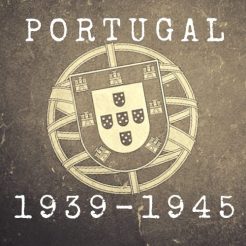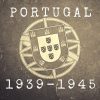Saudades
(Portugal)
Captain: Joaquim Andrade Rainho
Type: Vapor de carga
Tonnage: 4745
Owner: Sociedade Geral de Comércio, Indústria e transportes
Homeport: Lisboa
Built: Germany, 1913
Event: Rescued 16 shipwreked from the "Holmside" on 24 July 1941, after it was sunk by U-66.
On July 24 and 1941, the crew of the freighter "Saudades" sailed from the port of Praia, in Cape Verde, to Lisbon, when, at 19.50 hours, they sighted 120 miles north of the archipelago, repeated signs with a white light that was joined also by a red one.
Believing that if there could be shipwrecked, Captain Joaquim Andrade Rainho turned the ship in that direction and, as they approached, they could perceive that the lights repeated, in Morse code, the SOS distress request.
On three rafts, tied together, were 16 shipwrecked persons who after several manoeuvres were put aboard, stating that they belonged to the crew of the British steamer "Holmside", torpedoed on 19 July 1941.
To the press the Portuguese reported that many of the men were so exhausted that they were stretched inanimate on the rafts. Some of them were completely naked, and both the Portuguese crew and officers handed over clothing and footwear to give the newcomers a better appearance. Andrade Rainho gave up one of his uniforms to the captain of the Holmside, Norman Caulfield, who was among the survivors.
The "Saudades" nurse also needed all his skills treating the wounded, because many had fragments of shrapnel in the arms and legs since the attack.
Faced with the state of weakness of the castaways it was decided to introduce solid foods in a phased manner. So on the first day they were given only water and cognac; in the second they continued to give them water, but now with some cookies and only in the third they gave them access to stronger foods and also to tobacco.
When "Saudades" entered Lisbon on August 1, 1941, he also had brought one of the rafts. In the harbor was the English consul in Lisbon who, with Captain Caulfield, attempted to reimburse Andrade Rainho for the clothes, food, and tobacco that had been supplied to the British, but he refused any payment claiming that he had been in depth, since in World War I He had also been shipwrecked having been rescued by a British ship.
The injured and exhausted men were sent to the English Hospital in Lisbon.
The sinking of the "Holmside"
The ship sailed from Oban, Scotland, to Freetown, Sierra Leone, on July 5, 1941 as part of OG-67 convoy. On the until the 13th, when it took its route independently.
All went well until 8.45 on July 19 when they were hit by two torpedoes fired in sequence by the U-66. The explosions destroyed the bridge. A whaler disappeared and the same happened to the main mast. Among the destruction, which was visible everywhere, the hull had holes on both the port and the starboard sides, and there was no doubt that it was doomed.
In the midst of the chaos, the 37 crewmen tried to put the lifeboats and other means of rescue in the water, but the confusion and destruction prevented 21 of them from saving themselves and after the ship disappeared, which happened four minutes after it was hit, there were no lifeboats in conditions to be used.
The survivors found themselves on rafts that were tied to one another, hoping to take advantage of the supplies they had stored, but the salt water eventually contaminated the drinking water and the biscuits.
When they were discovered by the "Saudades" they were drinking brackish water for a couple of days - a mixture of fresh and salt water that had entered the tanks - and eating soft, wet and salty biscuits. The tongues were swollen and the bodies dehydrated. Canned condensed milk was the only part of the food that had not been tainted.
Holmside
(GB)
Captain: Norman Caulfield
Type: Steam merchant
Tonnage: 3433
Owner: Burnett SS Co Lda
Homeport: Newcastle
Built: GB, 1930
Fate: Sunk by U-66 on 19 July 1941. 21 died, 16 survived.
Resources:
- Archives: Arquivos Nacionais Torre do Tombo (PT); National Archives UK, Kew (GB); Arquivo Histórico da Marinha (PT); Arquivo Histórico do MNE (PT);
- Sites: uboat.net; naviosvelhos.blogspot.com
- Books & Publications: Shipping Company Losses of the second World War, Ian M. Malcolm; Navios da Marinha Portuguesa, datas 1939 a 1945;

